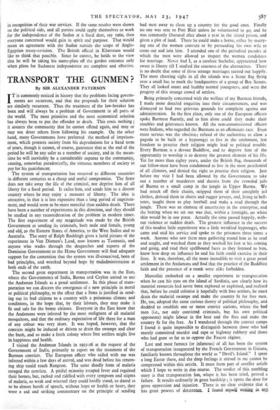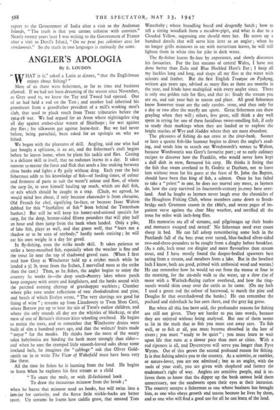TRANSPORT THE GUNMEN ?
By SIR ALEXANDER PATERSON
IT is commonly noticed in history that the problems facing govern- ments ments are recurrent, and that the proposals for their solution are similarly recurrent. Thus the treatment of the law-breaker has been and will always be a problem of Government in all parts of the world. The most primitive and the most economical solution has always been to put the offender to death. This costs nothing ; it assures the community that he cannot offend again, and may or may not deter others from following his example. On the other hand, many Governments have preferred the method of imprison- ment, which protects society from his depredations for a fixed term of years, though it cannot, of course, guarantee that at the end of the period he will be any safer as a member of society, and in the mean- time he will inevitably be a considerable expense to the community, causing, somewhat paradoxically, the virtuous members of society to pay for his punishment.
The system of transportation has recurred to different countries in different centuries as a cheap and useful compromise. The State does not take away the life of the criminal, nor deprive him of all liberty for a fixed period. It exiles him, and sends him to a distant country where he may enjoy a measure of liberty. The idea is attractive, in that it is less expensive, than a long period of imprison- ment, and would seem to be more merciful than sudden death. There have been a number of experiments in this direction, and they should be studied in any reconsideration of the problem in modern times. The first experiment of any magnitude was made by the British Government in sending its criminals, both male and female, young and old, to the Eastern States of America, to the West Indies and to Australia. The story of Ralph Rashleigh gives a lurid picture of the experiment in Van Diemen's Land, now known as Tasmania, and anyone who wades through the despatches and reports of the Dominion Government to the Home Government will find adequate support for the contention that the system was ill-conceived, born of bad principles, and wrecked beyond hope by maladministration at both ends of the earth.
The second great experiment in transportation was in the East, where the Governments of India, Burma and Ceylon united to use the Andaman Islands as a penal settlement. In this phase of trans- portation we can discern the emergence of a new principle in moral or political philosophy, to the effect that a State is justified in send- ing out its bad citizens to a country with a poisonous climate and conditions, in the hope that, by their labours, they may make it fit and safe for the better citizens. Everyone in the East knew that the Andaman were infested by the most malignant of all malarial mosquitoes, and that the ordinary expectation of life there for a man of any colour was very short. It was hoped, however, that the convicts might be induced or driven to drain the swamps and clear the bush, and so make a fresh colony where free settlers might live in happiness and health.
I visited the Andaman Islands in 1925-26 at the request of the Government of India, primarily to report on the treatment of the Burman convicts. The European officer who sailed with me was infected within a few days of arrival, and was dead before his return- ing ship could reach Rangoon. The same deadly form of malaria ravaged the convicts. A pitiful minority escaped fever and regained their homes, but, racked and riddled with every symptom and stigma of malaria, so weak and wizened they could hardly stand, so dazed as to be almost bereft of speech, without hope or health or heart, they were a sad and striking commentary on the principle of sending bad men away to clean up a country for the good ones. Finally no one was sent to Port Blair unless he volunteered to go, and he was commonly liberated after about a year in the island prison, and given a plot of land. There he could make a home, either by marry- ing one of the women convicts or by persuading his own wife to come out and join him. I attended one of the periodical parades at which the men were allowed to inspect the women candidates for marriage. Never had I, as a carefree bachelor, appreciated how sweet is liberty till I studied the sourness of the alternatives. There is no doubt that some of these strange marriages turned out happily. The most cheering sight in all the islands was a Scout flag flying over a small but to mark the headquarters of a group of Boy Scouts. They all looked smart and healthy normal youngsters, and were the progeny of this strange crowd of settlers.
Being primarily concerned with the welfare of my Burman friends, I made more detailed enquiries into their circumstances, and was dismayed to find two grievous grounds for complaint against our administration. In the first place, only one of the European officers spoke Burmese fluently, and to him alone could they make their troubles and grievances known. All the non-commissioned officers were Indians, who regarded the Burmans as an effeminate race. Even more serious was the obstinate refusal of the authorities to allow a pagoda to be built or a hypoongyi to Jive in the settlement, lest freedom to practise their religion might lead to political trouble. Every Burman is a devout Buddhist, and to deprive him of the opportunity to worship is to destroy the greatest element of his life. Yet for more than eighty years, under the British flag, thousands of our fellow-men have been condemned to live in the most pestilential of all climates, and denied the right to practise their religion. Just before my visit I had been allowed by the Government to take out a number of murderers and dacoits from the crowded jails of Burma to a small camp in the jungle in Upper Burma. We had struck off their chains, stripped them of their unsightly jail clothes, dreSsed them in shorts and rugger jerseys, and, living inbell- tents, taught them to play football and make a road through the jungle. There was an element of uncertainty in the enterprise, and the betting when we set out was that, within a fortnight, no white skin would be in one piece. Actually the time passed happily, with- out violence or sudden death. The greatest influence in the success of this modest little experiment was a little wrinkled hypoongyi, who came and said his service and spoke to the prisoners three times a week. Anyone who saw these men gathering round him as he read and taught, and watched them as they washed his feet at his coming and going, and read their spellbound faces as they listened to him, knew how deep an influence he and his faith could exercise in their lives. It was, therefore, all the more incredible to visit a great penal settlement in the Andaman and find that the practice of the Buddhist faith and the presence of a• monk were alike forbidden.
Mussolini embarked on a smaller experiment in transportation when he cast his eyes on the island of Sardinia, saw clearly how its material resources had never been explored or exploited, and realised that, before he could colonise it hopefully with free settlers, he must drain the malarial swamps and make the country fit for free men. He, too, adopted the same curious theory of political philosophy, and decided to establish one or more convict stations, where the bad men (i.e.,' not only convicted criminals, but his own political opponents) might labour in the heat and the flies and make the country fit for the free. As I wandered through the convict camps I found it quite impossible to distinguish between those who had merely committed murder and rape or highway robbery and those who had gone so far as to oppose the Fascist regime.
Last and most famous (or infamous) of all has been the system of transportation inaugurated by the French Government in Guiana, familiarly known throughout the world as " Devil's Island." I spent a long Easter there, and the deep feelings it stirred in me cannot be compressed within this article. It must form part of another article
which I hope to write in due course. The verdict of this rambling story is that transportation has, where it has been tried, proved a
failure. It results ordinarily in great hardship ; it opens the door for gross oppression and injustice. There is no clear evidence that it, has great powers of deterrengc, I found myself mating in toy) report to the Government of India after a visit to the Andaman Islands, " The truth is that you cannot colonise with convicts." Nearly twenty years later I was writing to the Government of France after a visit to Devil's Island, "On ne peut pas coloniser avec les condamnes." So the truth in two languages is curiously the same.



































 Previous page
Previous page